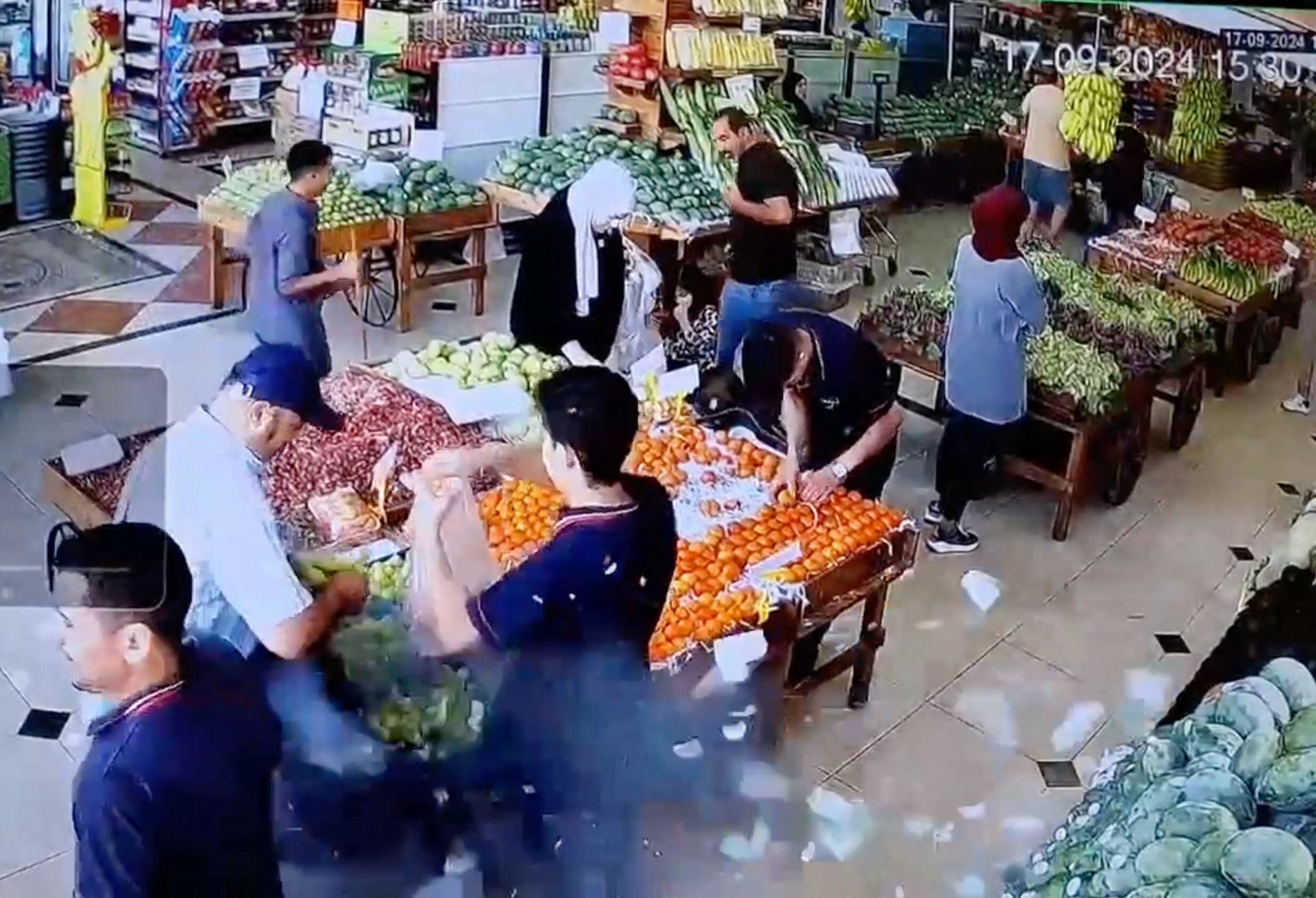Israel's Mossad spy agency planted a small amount of explosives inside thousands of pagers ordered by Hezbollah months before the devices exploded, a Lebanese security source has told the Reuters news agency.
The senior source said the militant group had ordered 5,000 beepers, which several other sources said were brought into Lebanon in the spring.
The same source claimed the devices had been modified by Israel's spy service "at the production level".
A second security source told Reuters that up to three grammes of explosives were hidden in the new pagers that went "undetected" by Hezbollah for months.
Images of the destroyed devices analysed by Reuters showed a format and stickers consistent with the AR-924 model of pagers with Gold Apollo branding - a Taiwan-based company.
 CCTV footage screenshot shows the moment of the pager explosion of a vegetable shop customer (second from left) in Lebanon, 17-9-24. Image: Abaca Press / Alamy
CCTV footage screenshot shows the moment of the pager explosion of a vegetable shop customer (second from left) in Lebanon, 17-9-24. Image: Abaca Press / AlamyThe firm's founder Hsu Ching-Kuang said the devices were actually made under licence in Europe by a firm called BAC, using the Gold Apollo name.
In a statement, the company said: "Apollo Gold Corporation has established a long-term private label authorisation and regional agency cooperation with BAC.
"According to the agreement, we authorise BAC to use our brand trademark for production sales in specific regions, but the design and manufacturing of the products are entirely handled by BAC."
Apollo Gold said the European firm was based in the Hungarian capital Budapest but declined to give further details.
'Israeli aggression'
Nine people were killed and thousands seriously injured in Tuesday's explosions in different parts of Lebanon, the country's health minister said.
Firas Abiad said 200 of the 2,750 wounded were in a critical condition.
Lebanese officials laid the blame on "Israeli aggression", while Hezbollah promised to retaliate, insisting Israel would receive "its fair punishment" for the blasts.
The Israeli military, which has been engaged in cross-border fighting with Hezbollah since the start of the war in Gaza in October last year, has refused to respond to questions about the detonations.
Experts broadly agree the blasts do not look like a typical lithium battery fire.
'De-escalation'
Speaking ahead of Cabinet this morning, Taoiseach Simon Harris said the development is "extraordinarily concerning".
"What happened in Lebanon is extraordinarily concerning because what we have seen are significant explosions in civilian areas, including in a supermarket," he said.
"We've seen very distressing and upsetting scenes of civilians and children being caught up in this situation.
"What the Middle East needs to see is de-escalation, not escalation."
“We all must work to step back from the brink in terms of the Middle East.”
The Taoiseach says it is “extraordinarily concerning” to see civilians and children injured across Lebanon in a pager attack that Hezbollah blames on Israel.— NewstalkFM (@NewstalkFM) September 18, 2024
Mr Harris, who will attend the United Nations General Assembly next week, said he will be bringing one message.
"We all must work to step back from the brink in terms of the Middle East," he said
"I think it's extraordinarily concerning what we've seen.
"Obviously countries rights to defend itself, countries rights to address terrorism is a legitimate right but when explosives are being detonated and civilians being impacted and taking place in locations with many, many civilians, that's extraordinarily concerning and it's a very unwelcome escalation."
Security Analyst Senator Tom Clonan told Newstalk Breakfast Hezbollah likely considered pagers safer than mobile phones.
"Hezbollah have been targeted recently in pinpoint attacks," he said.
"A number of their combat and political leaders were assassinated by drone strike.
"Hezbollah believed that mobile phone traffic had been used to triangulate their positions.
"So recently Hezbollah issued its wide and vast membership with these pagers."
Senator Clonan added that the group felt the older technology "would be more difficult to track."
Listen back here:
Reporting by: Stephanie Rohan and IRN








